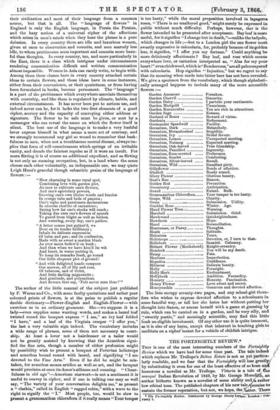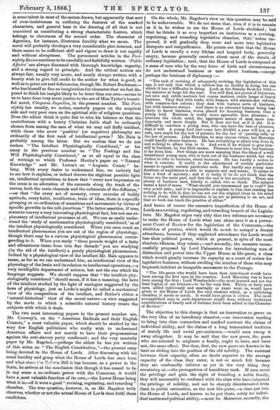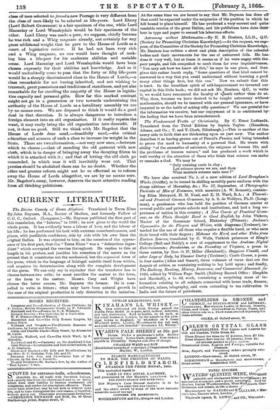THE FORTNIGHTLY REVIEW.*
• The Fortnightly Review. Conducted by George bleary Le*,,j. London Feb- ruary 1. Tars is one of the most interesting numbers of the Fortnightly # Review which we have had for some time past. The tale indeed 1' which replaces Mr. Trollope's Belton Estate is not as yet particu- larly readable, and we fear that the Fortnightly will lose greatly/ by substituting it even for one of the least effective of so keen and humorous a novelist as Mr. Trollope. Vittoria is a tale of he manqué Italian Revolution of 1849, by Mr. George Meredkra, an author hitherto known as a novelist of some ability and.‘, rather low ethical tone. The published chapters of his new taleA romise to sustain the former reputation, but not, we hope, the Jitter. There
is some talent in most of the scenes drawn, but apparently that sort of over-incisiveness in outlining the features of the marked characters, and general haze in the drawing of all that is not conceived as constituting a strong characteristic feature, which belongs to cleverness of the second order. The character of Agostino, for instance, illustrates forcibly what we mean. The novel will probably develope a very considerable plot-interest, and
there seems to be sufficient skill and vigour to draw it out rapidly and without abruptness. The permanent articles in the Fort- nightly Review continue to be carefully and faithfully written. 'Public Afrairs' are always discussed with thorough knowledge, sagacity, and a strong regard to principle. And the critical notices are
always fair, usually very acute, and nearly always written with a
hearty wish to give full credit to the author for what is good, as well as to point out real deficiencies, though Mr. Robert Buchanan—
who has himself so fine an imagination for character that we feel dis-
posed to think his insight likely to be truer than our own—seems to us to have done very scant justice to the art of Miss Tytler's beauti- ful novel, Citoyenne Taqueline, in the present number. The Fort- nightly has usually, we notice, masterly papers on the sceptical side and very poor ones on the spiritual side of religious questions. DOB3 the editor think it quite fair to trim his balance so that the
contributors with a hearty Christian faith shall be ordinarily chosen from among the men of what we may call fluffy intellect, while those who avow 'positive' (or negative) philosophy are ordinarily of the first rank of intellectual power ? Mr. Bain is probably among the latter. But we confess that we do not reckon "The Intellect Physiologically Considered," or his essay in the previous number on "The Feelings and the Will Physiologically Considered," as at all equal to the class of writings to which Professor Huxley's paper on "Natural Knowledge" and Mr. Lewes's on "Auguste Comte" be- long. With every desire to understand him, we entirely fail to see how it explains, or indeed throws the slightest possible light on, intellectual operations, to know that "every new impression on the sense is an alteration of the currents along the track of the nerves, both the main channels and the collaterals of the diffusion," —or that "for every act of memory, every exercise of bodily aptitude, every habit, recollection, train of ideas, there is a specific grouping or co-ordination of sensations and movements by virtue of specific growths in the cell-junctions." The latter assertion, if true, seems to convey a very interesting physiological fact, but not one ex- planatory of intellectual processes at all. We can as easily under- stand the 'study of mathematics physiologically considered,' as of the intellect physiologically considered. When you once reach an intellectual phenomenon you are out of the region of physiology, though there may be a curious physiological phenomenon corres- ponding to it. When you study "three pounds weight of a fatty and albuminous tissue done into fine threads" you are studying (by the aid of the intellect) a purely physiological phenomenon.
Indeed by a physiological view of the intellect Mr. Bain appears to mean, as far as we can understand him, an intellectual view of the physiology of the brain and its relation to intellectual operations,—a very intelligible department of science, but not the one which his language suggests. We should suppose that "the intellect phy- siologically considered "should mean, if it has a meaning, the laws of the intellect studied by the light of analogies suggested by the laws of physiology, just as Locke's might be called a mechanical view of the composition of the intellect, and Butler's ethics a ' natural-historical ' view of the moral nature—a view suggested by the mode in which a scientific natural history treats the subjects with which it deals.
The two most interesting papers in the present number are, Mr. Conway's, on the "American Radicals and their English
Censors," a most valuable paper, which should be studied by the very few English politicians who really wish to understand American affairs and not merely to have their prepossessions against the anti-slavery party confirmed ; and the very masterly paper by Mr. Bagehot,—perhaps the ablest be has yet written of this series on "The English Constitution,"—the present may being devoted to the House of Lords. After discussing with his usual lucidity and grasp what the House of Lords has once been and what sine.) Vie 11,Pf,ipn Bill it has become, as a power in the Sate, he arrives at the conclusion that though it has ceased to be in any sense a co-ordinate power with the Commons, it would have a dzost valuable function of its own,—the Lower House being what it is,—if it were a good "revising, regulating, and retarding" chamber. The true question, however, is, as Mr. Bagehot truly observes, whether or not the actual House of Loris does fulfil these conditions. On the whole, Mr. Bagehot's view on this question may be said to be unfavourable. We do not mean that, even if it is to remain as it is, he wishes to see the House of Lords abolished ; but that he thinks it so very imperfect an institution as a revising, regulating, and retarding legislative chamber, that, unless im- proved, it will gradually drop more and more into legislative disrepute and insignificance. He points out first that the House of Lords is usually a very lifeless and languid body, generally empty, because generally careless about most of the details of ordinary legislation ; next, that the House of Lords is composed of a mass of men who by the very force of birth and circumstances do not understand business or care about business,—except perhaps the business of diplomacy :— " The task of revising, of adequately revising, the legislation of this age, is not only that which a noblesse has no facility in doing, but one which it has a difficulty in doing. Look at the Statute Book for 1865— the statutes at large for the year. You will find, not pieces of literature, not nice and subtle matters, but coarse matters, crude heaps of heavy business. Tkey deal with trade, with finance, with statute-law reform, with common-law reform ; they deal with various sorts of business, but with business always. And there is no educated human being less likely to know business, worse placed for knowing business, than a young lord. Business is really more agreeable than pleasure ; it interests the whole mind, the aggregate nature of man, more con- tinuously, and more deeply. But it does not look as if it did. It is difficult to convince a young man, who can have the best of pleasure, that it will. A young lord just come into 30,000/. a year will not, as a rule, care much for the law of patents, for the law of 'passing tolls,' or the law of prisons. Like Hercules, he may choose virtue, but Hercules could hardly choose business. He has everything to allure him from it, and nothing to allure him to it. And even if he wished to give him- self to business, he has little means. Pleasure is near him, but business is far from him. Few things are more amusing than the ideas of a well intentioned young man, who is born out of the business world, but who wishes to take to business, about business. He has hardly a notion in what it consists. It really is the adjustment of certain particular means to equally certain particular ends. But hardly any young man destitute of experience is able to separate end and means. It seems to him a kind of mystery ; and it is lucky if he do not think that the forms are the main part, and that the end is but secondary. There are plenty of business men, falsely so called, who so think. The subject seems a kind of maze. What should you recommend me to read ?' the nice youth asks • and it is impossible to explain to him that reading has nothing to do with it, that he has not yet the original ideas in his mind to road about, that administration is an art as painting is an art, and that no book can teach the practice of either."
And hence of course the excessive imperfection of the House of Lords as a revising, regulating, and retarding branch of the Legisla- ture. Mr. Bagehot urges very ably that two reforms are necessary to make the House of Lords what can alone save it as a perma- nent Court of Review for the legislation of the Commons,—the abolition of proxies, which would do much to compel a decent attendance, because if they neglected attendance the Lords would lose their political power, which at present, in spite of the most absolute idleness, they retain ;—and secondly, the measure unsuc- cessfully proposed by Lord Palmerston for introducing men of distinction and power into the Upper House as life-peers, a class which would greatly increase its capacity as a court of review for legislative business, without swelling the number of those who may bequeath indolent or incapable successors to the Peerage.
"The life-peers who would have been then introduced would have been among the first men in the country. Lord Macaulay was to have been among the first ; Lord Wensleydale—the most learned and not the least logical of our lawyers—to be the very first. Thirty or forty such men, added judiciously and sparingly as years went on, would have given to the House of Lords the very element which, as a criticizing chamber, it needs so much. It would have given it critics. The most accomplished men in each department might then, without irrelevant considerations of family and of fortune, have been added to the Chamber of Review."
The objection to this change is that an innovation so grave on the very idea of an hereditary chamber,—an innovation tending to bring into close connection and marked contrast the claims of individual ability, and the claims of a long transmitted tradition of stately life and social pre-eminence,—would soon sweep it away altogether. It may be said that the new peers, the peers who are selected to originate a family, ought to have, and have not, the same effect. But then, first, the new peers are known to be bent on sliding into the position of the old nobility. The contrast between their capacity, often no doubt superior to the average capacity of the class they enter, is not so much felt because they are confessedly inferior as yet in the very thing they are aiming at,—the prerogatives of hereditary rank. If men covet the privilege and gain the right of founding a noble family, they will necessarily be confused with the class who have inherited the privilege of nobility, and not be sharply discriminated from them in public estimation, as the new life-peers,--a class put into the House of Lords, and known to be put there, solely for indivi- dual merits and political ability,—must be. Moreover, secondly, the the clam of men likely to be selected as life-peers.- Lord Ebary, (Lord Robert Grosvenor) is a fair specimen of the one, while-Lord
Macaulay or Lord-Wensleydale would be fair specimens of the
other. Lord Ebury was made a peer, we suppose, chiefly because he was rich and a. Whig magnate already, not certainly for any,
great additional weight that he gave to the House of Lords as a court of legislative review. If he had not been very rich and a Whig magnate, no one would have thought of mak- ing him a life-peer for his moderate abilities and amiable sense. Lord Macaulay and Lord Wensleydale would have been chosen expressly for their abilities and knowledge, And so it
would undoubtedly come to pass that the forty or fifty life-peers would be a sharply discriminated class in the House of Lords,—a class remarkable for not having. inherited, and not wishing to transmit, great possessions and traditions of stateliness, and yet also remarkable for far excelling the majority of the House in legisla,- tive capacity and personal gifts. How far this marked contrast might not go in a generation or two towards undermining the authority of the House of Lords as a hereditary assembly we are by no means sure. We are disposed to think it would do a good deal in that direction.. It is always dangerous to introduce a foreign element into an old organization. If it really-repairs- the want, it may easily bring the old organization into discredit. If not, it does no good. Still we think with Mr. Bagehot that the House of Lords does need,—dreadfully need,-.—the critical education* and acumen of such a class to increase its-weight in the State. There are two alternatives,—not very new ones, —between which to. choose ;—that of mending the old garment with new cloth, which is in danger of bringing away the decaying fibres to which it is attached with it ; and that of letting -the old cloth go =mended, in which case it will inevitably wear out. That proxleashould be abolished there can be no doubt. Whether the other and greater reform might not be- so effectual as to reform, away -the House of Lords altogether, we are by no means sure. Mr.- Bagehot's essay, however, deserves the most attentive reading from all thinking politicians.
































 Previous page
Previous page